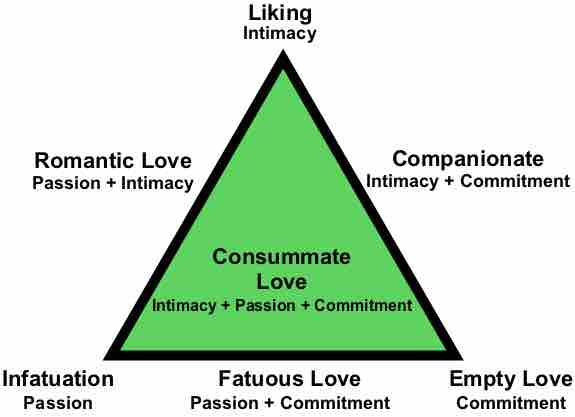Interpersonal Attraction
A major area in the study of people's relations to each other is interpersonal attraction. This refers to all of the forces that lead people to like each other, establish relationships, and in some cases, fall in love. Several general principles of attraction have been discovered by social psychologists. For example, physical proximity increases the likelihood of attraction, whereas long distances make relationships difficult to form and maintain. Even very small differences in distance—such as down the block compared to next door—can make a significant difference in friendship patterns. To be clear, just being near someone does not ensure attraction: there has to be a positive association to begin with. For instance, let's say you are attracted to someone who plays for your school's soccer team, who you see only from a distance during the occasional game, and equally attracted to someone who you have a class with every other day. You are more likely to end up being more attracted to the person in your class, even if the initial attraction to both individuals was the same. The physical proximity increases the already-existing physical attraction.
Familiarity, or "mere exposure," also increases attraction, influencing people even if the familiarity is not consciously noticed. For example, if two individuals meet in New York City and realize they both come from the same city in California, they are more likely to be attracted to one another. The familiarity increases comfort, which in turn increases the probability of attraction and love.
One of the most important factors in interpersonal attraction is similarity: the more similar two people are in attitudes, background, and other traits, the more probable it is that they will like each other. Contrary to popular belief, opposites do not usually attract. Physical attractiveness is an important element in romantic relationships, particularly in the early stages, which are characterized by high levels of passion. Later on, similarity and other compatibility factors become more important.
Sternberg's Components of Love
Psychologist Robert Sternberg views love as a triangle whose three sides consist of passion, intimacy, and commitment. When two people share all three, they are said to be in a state of consummate love; this condition is relatively rare and difficult to maintain for a long period of time. Love can be best described in reference to a relationship between two or more people, and is more evident in relationships that contain a mutual understanding, mutual support, and enjoyment of each other's company.

Sternberg's triangular theory of love
According to Sternberg, love consists of three components: passion (infatuation), commitment (companionship), and intimacy (liking). Having all three of these components is referred to as consummate love.
Passionate versus Companionate Love
Passionate love is an emotional love that is mostly expressed in a physical manner; it is a love that is shared between people who are intensely enamored with each other. Passionate love is both exciting and intense, and can be defined as a state of intense longing for union with another.
Companionate love, on the other hand, is best defined as passionate love that has settled to a warm enduring love between partners in a relationship; in Sternberg's terms, it is comprised of intimacy and commitment. Often found in long-term relationships, the companionate love shared between partners consists of fewer ups and downs than does passionate love. It is more stable and involves a deeper respect and affectionate attachment between partners. While the passion may have died down over time, a deep affection and commitment for the other person still remains.
Romantic love derives from a combination of the intimate and passionate components of love. Romantic lovers are bonded both intimately and passionately, but without sustaining commitment. Fatuous love is both passionate and committed, but lacks the stability that intimacy brings to relationships. It is termed fatuous because the commitment is made on the basis of passion alone.
Factors That Affect the Expression of Love
Love assumes many forms, and time and culture both have an effect on the love formed in a relationship. Time factors include the age or developmental stage of the individuals involved in the relationship, the length of the relationship, and/or the age difference between the partners. Culture plays a strong role in love and relationships. An individual's ethnicity, background, religion, or even financial stability can affect the way he or she expresses or receives love in a relationship. From an evolutionary point of view, both passionate and companionate love are adaptive: the former because it increases the likelihood of procreating, and the latter because it increases the likelihood of a long-term relationship and joint-parenting, which probably increases children's chances of survival.